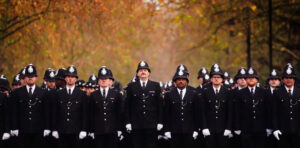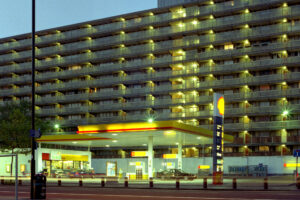One golden autumn afternoon, in a quiet North London suburb, I stumbled across a portal to a possible English future. Hadley Wood sits on the fringes of the city, between Barnet and the M25, seemingly forgotten in its own little world of metroland Tudor houses, dotted with fields of ponies and commemorative plaques to steam age pioneers. Yet between the wisteria and the Jags, there is a sense of unease.
Roving bands of career burglars stalk the area. “They come every day whether you’re inside or not,” explains one local man from behind his wheelie bin. “They don’t seem to care.” Everything is up for grabs, the man tells me, from Amazon packages in doorways to the Lexus in the drive.
Brazenness is hardly surprising. Hadley Wood is one of countless British communities effectively abandoned by the protective arm of the state. In 2018, the area suffered 65 break-ins, a criminal romp that nonetheless failed to stir the short arm of the law. Such an experience now marks suburban life in the capital, with the Met failing to solve a single crime in 160 residential areas of London over the last three years. “The police gave up on this area years ago,” one shrugging resident explains.
Such is the national mood. Trust in the police is at an historic low, with crime recently surging to the fourth-biggest issue in the country. Yet in this vacuum of order, Hadley Wood offers one potential solution. For £100 a month per household, a firm called My Local Bobby will be your private police force, patrolling the lanes and back alleys, responding in 30 seconds to a break-in and even picking your wife up from the station in the dark. I spotted them myself, crawling by in patrol cars as I strolled the empty streets. Behind them, meanwhile, is a team that’ll privately prosecute criminals through the courts, with a conviction rate of 100%, a service recently used by Reform UK after the alleged assault of a police officer at Manchester Airport.
Welcome to 21st-century Britain, where the state increasingly struggles to carry out its basic functions, and where private players now rush to fill the void. Nor, of course, is this merely a function of law and order. Rather, the phenomenon of My Local Bobby represents the loose thread of a fraying social contract. When the state is no longer capable of carrying out its basic functions, after all, why wouldn’t Britain’s narrowing band of middle-class taxpayers plump for something better?
The recent budget offered a grim reminder of this future zero-sum reality facing public service funding in England. Much of the tax revenue raised over the next few years, alongside additional borrowing, will be geared towards funding the NHS: a short-term spending splurge ahead of promised reform that’ll anyway peter out by 2025. This, it seems, is already happening at the expense of other public services. Despite Labour’s mission to “take back the streets”, the Met is set to lose another 2,000 officers amid yet another budget cut. That’s off the back of a decade in which police funding has already fallen by 20% in real terms.
Between the squeezed belts and the unsolved crime, it’s little wonder post-austerity Britain has conjured an alternative: My Local Bobby. Run by David McKelvey, the erstwhile detective’s career in the Met ended after a mob boss put a bounty on his head. These days, the man described by a former colleague “as a force of nature” runs Britain’s most successful private policing force from an Essex office. “There is demand for our services on a daily basis” right across the country, McKelvey tells me. When his team meets with prospective clients, he reports “a general sense that crime and anti-social behaviour is out of control and no one is doing anything about it”.
McKelvey claims to provide an “old fashioned” alternative to modern British policing, and one now being promised by the home secretary. In the busy streets of West London, where his team has its most established presence, he says his officers now respond to incidents before the police nine times in 10.
This is a style of policing that deliberately harks back to the foundational principles of Robert Peel, all the while shunning the odd mix of desk-bound surveillance and bureaucratic inertia that bogs down officers in the 21st-century public sector. My Local Bobby uses officers on the beat and local eyes and ears to provide intimate knowledge of the streets around them. That helps them catch shoplifters, seize drugs, break up fights and even prevent knife-wielding men from attacking the public — all armed with just body cameras and the training to conduct a citizen’s arrest.
“Most people just want a uniformed presence back on the street that gathers intelligence and catches criminals,” says McKelvey. “It’s not rocket science.” It’s certainly an approach that’s popular: British businesses and residents will soon spend £10 billion on private security, even as the Home Secretary has promised “a named officer for every community”. It nonetheless seems beyond the present capabilities of the public sector. In Devon and Cornwall, for instance, it recently cost £1 million to pay mostly overtime officers to patrol a crime hotspot for just 15 minutes once every three days.
That surely begs a question: why is it now so hard for the police to perform their most basic functions? For McKelvey, alongside the many other former and serving officers I spoke to, the answer amounts to an unprecedented institutional crisis. Between low morale, a defunding of specialist units, and a generational loss of talent, to say nothing of a “Spanish Inquisition” culture that leaves officers now “afraid to arrest suspects”. A worrying focus on “low hanging fruit” around communication offences hardly helps either, bemoaned one serving officer, even as they lament leadership that wanted to “solve societal ills” instead of busting criminals.
“Small teams [are] given autonomy and allowed to solve problems,” adds Dominic Adler, a former detective constable who now writes excoriating critiques of modern British policing on his Substack. “That’s the police I joined, not the bizarre bureaucratic behemoth that couldn’t find its arse with a map that exists.” Indeed, Adler continues, the current crisis is about more than staffing or austerity. “The post-Blair legal consensus was the knife that went into the police,” he says. “Theresa May and austerity twisted the knife and killed it.”
The upshot? A day-to-day experience of working in the police that Adler compares to Terry Gilliam’s dystopian film Brazil: leaving the station to arrest people involves satisfying a dizzying number of rules, regulations and procedures. This, Adler adds, has cultivated a procedurally obsessed management that resembles a “colonial police force made up of elite imperial seniors leading baffled local levies who can’t be arsed to point out the emperor is naked”.
For Carl, a former policeman who now runs My Local Bobby’s patrols in North London, this reality only struck him once he’d left the force. After spotting a man with a number plate down his trousers in North London, he and his team spent a week surveilling a burglary team across the South East. “We were watching them as they were breaking into houses,” Carl says, “phoning the police and saying, ‘look they’re going in now, you’ve got to come!’”
When the police eventually arrived, the burglars got away. Now outside the force, Carl’s freedom to pursue ground intelligence across North London has resulted in the arrest of numerous burglary teams, in partnership with the police. But this is essentially a privately-funded outsourcing of the Met’s old operation, which for its part has all but defunded its burglary investigation teams across London.
Beyond Hadley Wood, and back towards London’s inner suburbs, community WhatsApp groups abound with rumours of the help available to more affluent neighbours. Yet if these private efforts are successful on their own terms — My Local Bobby helped cut vehicle crime in Hadley Wood by 38% — communally financing can be tough, even humiliating, for those who can’t afford it. One man in Fulham describes how a neighbour, who chose not to pay for the road’s private security team, discovered that they were contractually obliged to stand by as his house was robbed.
Paul in Shoreditch has a similar anxiety. He describes how the end of his road has turned into a “hotspot for crack addicts and drug dealers” that left residents afraid to venture out after dark. What followed was a three-month struggle that saw him deal with the council, write to the Met Commissioner, and eventually enquire about the services of a company called Shoreditch Security: which ultimately gave residents a quote of £1,000 a week. At the time, this proved too much. “We all pay taxes and extensive council tax,” Paul says. “We should at a basic level already feel protected.”
And if that raises the ominous prospect of a nation wracked by two-tier policing — with some describing My Local Bobby as a return to the 18th century tradition of “thief-takers” hired expressly by the wealthy victims of crime — there are other fears too. Many private officers are veterans of the Metropolitan Police, but Londoners have occasionally worried about the blurred lines around who can legally use force. Certainly, some private guards seem happy to throw their weight around. In 2023, for instance, an anti-Ulez protester was allegedly run over by a man hired to defend the controversial cameras.
Of course, none of this would matter if the actual police worked as intended. If it did, even by McKelvey’s own admission, outfits like My Local Bobby wouldn’t have a market. Yet speaking to one officer of 20 years, now on the verge of leaving, reform seems unlikely. “We’ve lost sight of who and what policing is for,” he tells me. “Its present state appeals to a tiny elite minority who only understand how bad it is until they get their car stolen. We need to start again. A total root-and-branch redrawing so we can return to the original reason it was set up: to gather intelligence locally and nick people.”
Back in Hadley Wood, locals now seem blissfully unaware of the growing tensions of the 21st-century English social contract they’ve managed to leave behind. For the world beyond Hadley Wood, however, officers predict something far grimmer: a growing mix of private security alongside failing institutional forces and an appetite for public vigilantism. “There’ll be a situation where the police really lose the streets,” Adler warns, “and the public will look at the Government and say, ‘what the fuck’s actually going on here?’” In Hadley Wood, and other suburbs of North London, a quieter form of that reckoning has already begun.
Disclaimer
Some of the posts we share are controversial and we do not necessarily agree with them in the whole extend. Sometimes we agree with the content or part of it but we do not agree with the narration or language. Nevertheless we find them somehow interesting, valuable and/or informative or we share them, because we strongly believe in freedom of speech, free press and journalism. We strongly encourage you to have a critical approach to all the content, do your own research and analysis to build your own opinion.
We would be glad to have your feedback.
Source: UnHerd Read the original article here: https://unherd.com/



